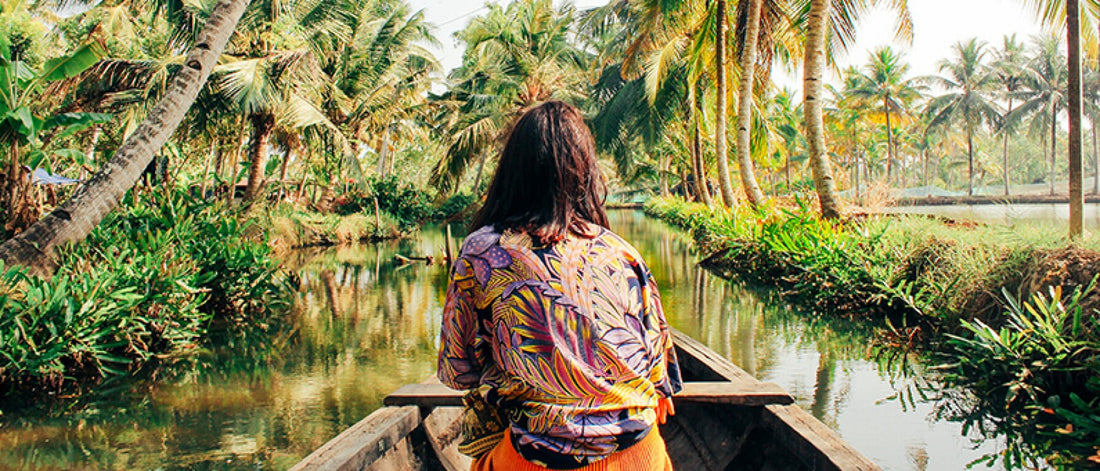Are you on a solo holiday for a few days? Are you finally taking that much-needed family vacation? Do your summer vacation plans include travel? Whether your next vacation is a big trip, a weekend getaway, or just one day off, do your best to make it a sustainable vacation.
According to the United States Environmental Protection Agency (US EPA), “Everything that we need for our survival and well-being depends, either directly or indirectly, on our natural environment. To pursue sustainability is to create and maintain the conditions under which humans and nature can exist in productive harmony to support present and future generations.” In your personal life, sustainability refers to being able to continue doing what you are doing in the way that you are doing it for a long, long time.
As you assess your life, consider how you can make some small changes that will have big impacts on your overall well-being. When you are well, you will better be able to show up for your family, friends, coworkers, and community as the best version of yourself. The sustainability of the planet depends on your well-being!
How can you work for the betterment of all beings if you yourself are exhausted, worn out, or shut down? One of the values of the Omega Institute, a holistic gathering space dedicated to “innovative educational experiences that awaken the best in the human spirit,” is sustainability: “We hold an optimistic view that each of us can contribute toward a regenerative future. We recognize that the natural environment cannot be protected without creating social cohesion, economic stability, universal human rights, and a culture of peace. We are committed to developing paths forward by demonstrating actionable solutions.” If you are interested in the sustainability of the planet, don’t forget that you are also an inhabitant of this earth and that your physical, mental, emotional, and spiritual well-being is worth sustaining first.
There are many practical ways to exercise sustainable travel. As you move toward a sustainable way of life for yourself, your fellow humans, animals, plants, and planet, consider the following tips for conscious travel.
For example, always look into the politics of the owners of the hotels and tour companies you visit. Look for fair trade, fair treatment of workers, organic, and evidence of eco and sustainable promises and contributions made to the local community. See if the place you plan to stay has a partnership with a local NGO or an opportunity to volunteer in the community in which you are traveling. Your money and energy are supporting these organizations and people. Make your travel dollars count!
Start with the ideas offered by the Natural Resources Defense Council (NRDC) and search from there. Even better, try a new way of vacationing: sign up for a biking trip, challenge yourself to only use public transit while in a new city (support public transit!), or explore entirely by foot (get in those steps!). New rental bikes and scooters are a low-cost, low-impact way to get around and are available in most cities.
What Is Sustainability?
When you think of “sustainability”, you may be wondering what exactly that means and how you can practice it. According to those who study environmental science, “When we hear the word ‘sustainability’ we tend to think of renewable fuel sources, reducing carbon emissions, protecting environments, and a way of keeping the delicate ecosystems of our planet in balance. In short, sustainability looks to protect our natural environment, human and ecological health, while driving innovation and not compromising our way of life.” In other words, achieving sustainability will enable earth to continue supporting life.According to the United States Environmental Protection Agency (US EPA), “Everything that we need for our survival and well-being depends, either directly or indirectly, on our natural environment. To pursue sustainability is to create and maintain the conditions under which humans and nature can exist in productive harmony to support present and future generations.” In your personal life, sustainability refers to being able to continue doing what you are doing in the way that you are doing it for a long, long time.
Sustainability and Your Personal Life
Before you can help sustain the earth, you need to be able to take care of yourself. Let’s look at sustainability in terms of your personal life:- Are you living beyond your means?
- Are you working so much you barely have time for sleep?
- Have friendships fallen by the wayside?
- Is solo time even in your top five priorities?
As you assess your life, consider how you can make some small changes that will have big impacts on your overall well-being. When you are well, you will better be able to show up for your family, friends, coworkers, and community as the best version of yourself. The sustainability of the planet depends on your well-being!
How can you work for the betterment of all beings if you yourself are exhausted, worn out, or shut down? One of the values of the Omega Institute, a holistic gathering space dedicated to “innovative educational experiences that awaken the best in the human spirit,” is sustainability: “We hold an optimistic view that each of us can contribute toward a regenerative future. We recognize that the natural environment cannot be protected without creating social cohesion, economic stability, universal human rights, and a culture of peace. We are committed to developing paths forward by demonstrating actionable solutions.” If you are interested in the sustainability of the planet, don’t forget that you are also an inhabitant of this earth and that your physical, mental, emotional, and spiritual well-being is worth sustaining first.
What Is Sustainable Tourism?
When considering how your next vacation can be sustainable, it is important to bear in mind ways you can approach sustainability in terms of your personal experience (travel can certainly take a toll on your health), the environmental impact of your trip (where you travel and how you travel matter), and the impact you have on the people who live where you vacation (these folks are most likely not on vacation while you are). Try answering the following questions:- Are you willing to spend a few hours of your vacation giving back to the community you are visiting?
- Are you willing to offer up a few dollars to offset the carbon footprint of your road trip?
- Are you willing to take good care of the hotel workers who make your bed and clean your bathtub by leaving generous tips?
There are many practical ways to exercise sustainable travel. As you move toward a sustainable way of life for yourself, your fellow humans, animals, plants, and planet, consider the following tips for conscious travel.
1. Do Your Research
Traveling to distant lands has impacts on the people and places that you visit. Although it might seem that you're making a positive impact on the economic growth of wherever you visit, there are other impacts that come as a result of tourism. As you prepare to visit new places, do some quality research about the quality of life in the area in which you plan to play.For example, always look into the politics of the owners of the hotels and tour companies you visit. Look for fair trade, fair treatment of workers, organic, and evidence of eco and sustainable promises and contributions made to the local community. See if the place you plan to stay has a partnership with a local NGO or an opportunity to volunteer in the community in which you are traveling. Your money and energy are supporting these organizations and people. Make your travel dollars count!
2. Offset Your Carbon Footprint
Traveling by airplane, car, or cruise ship has immediate and detrimental impacts on the environment. As you prepare for your next trip, think (and learn!) about the effect your travel has on the air, water, and soil. Consider offsetting your carbon footprint (the generation of carbon dioxide and other greenhouse gas emissions that contribute to climate change). There are numerous organizations that work in this arena.Start with the ideas offered by the Natural Resources Defense Council (NRDC) and search from there. Even better, try a new way of vacationing: sign up for a biking trip, challenge yourself to only use public transit while in a new city (support public transit!), or explore entirely by foot (get in those steps!). New rental bikes and scooters are a low-cost, low-impact way to get around and are available in most cities.
3. Tip Generously
Your tip of 5, 10, or 20 dollars could go a long way for the hotel staff, cleaning crew, construction workers, tour guides, and homestay hosts where you travel. Change the stereotype of the stingy traveler and tip well beyond the percentage recommended! A relatively small bit of change for you could mean dinner for a week for a poor family, the funding of education for a young child, or the means for a worker to leave a dangerous domestic situation.4. Leave No Trace
The Leave No Trace principles can help guide you as you travel sustainably. Following the principles, whether your travel includes backcountry exploration or wilderness adventure or not, provides a framework for the sustainable traveler. Model a sustainable example and take the extra step to leave the place you have visited even better than you found it (it could truly be as simple as picking up five pieces of trash on the beach!). You can bring about positive environmental impacts with the following seven principles:- Plan ahead and prepare. Planning ahead helps ensure the safety of groups and individuals.
- Travel and camp on durable surfaces. The goal of travel in the outdoors is to move through natural areas while avoiding damage to the land or waterways.
- Dispose of waste properly. “Pack it in, pack it out” is a familiar mantra to seasoned wildland visitors. Any user of recreation lands has a responsibility to clean up before he or she leaves to protect our environment.
- Leave what you find. Allow others a sense of discovery by leaving rocks, plants, archaeological artifacts, and other objects of interest as you find them. “Collect memories, not things.”
- Minimize campfire impacts. A true leave-no-trace fire shows no evidence of having been constructed.
- Respect wildlife. Considerate campers observe wildlife from afar, give animals a wide berth, store food securely, and keep garbage and food scraps away from animals.
- Be considerate of other visitors. Maintain courtesy toward other visitors, as it helps everyone enjoy their outdoor experience.
5. Take Care of Yourself
Traveling, or a change in routine of any kind (even a staycation!), has impacts on your body and mind. As you plan your trip, plan ahead to prepare yourself well for the possible health effects of air travel, different sleeping arrangements, new foods, and, depending on how you like to holiday, the physical strains on your body from adventure.6. Follow CREST’s Sustainable Tourism Tips
The Center for Responsible Travel (CREST) is a nonprofit focused on sustainable tourism. Their mission statement is “To promote responsible tourism policies and practices so that local communities may thrive and steward their cultural resources and biodiversity.” CREST suggests the following tips for practical, sustainable travel:- Ask about the environmental policies and practices of hotels and tour operators you are considering.
- Look for a local conservation or community development project in which to participate or donate.
- Eat at any locally owned business.
- Stay in locally owned lodges, hotels, and bed and breakfasts.
- Purchase locally made handicrafts and products.
- Avoid entirely crafts and products from protected or endangered animals.
- Hire local guides that are licensed and live locally.
- Always ask permission before sacred places and private land.
- Always ask permission before taking photos of individuals.
- Pay the fair price—don’t engage in overly aggressive bargaining.
- Dress appropriately for local customs.
- Take the time to learn some words in the local language.
- Use limited resources, such as water, fuel, and electricity, wisely.
- Share your experiences and promote responsible companies, destinations, and practices when you return home.
7. Practice Environmentally Responsible Tourism
The Better World Handbook: From Good Intentions to Everyday Actions also has the following practical recommendations for traveling responsibly. According to the authors, supporting environmentally responsible tourism means that you are “encouraging local landowners to develop tourist facilities with less environmental impact; promoting environmental awareness, education, and the protection of natural resources; spending money that supports local projects in agriculture, water supplies, tree farms, and others; [and] providing economic incentive to stop wildlife poaching and protect natural areas.” Here are some of their sustainability travel tips:- Explore your own backyard.
- Experience nature.
- Visit state and national parks.
- Travel off-season and to unknown places.
- Stay with the locals.
- Exchange your home.
- Stay in a hostel.
- Connect with the local people.
- Limit your vacation trinkets.
- Support local economies.
- Take an eco-friendly journey.
- Combine service and travel.
- Take a personal growth vacation.






















